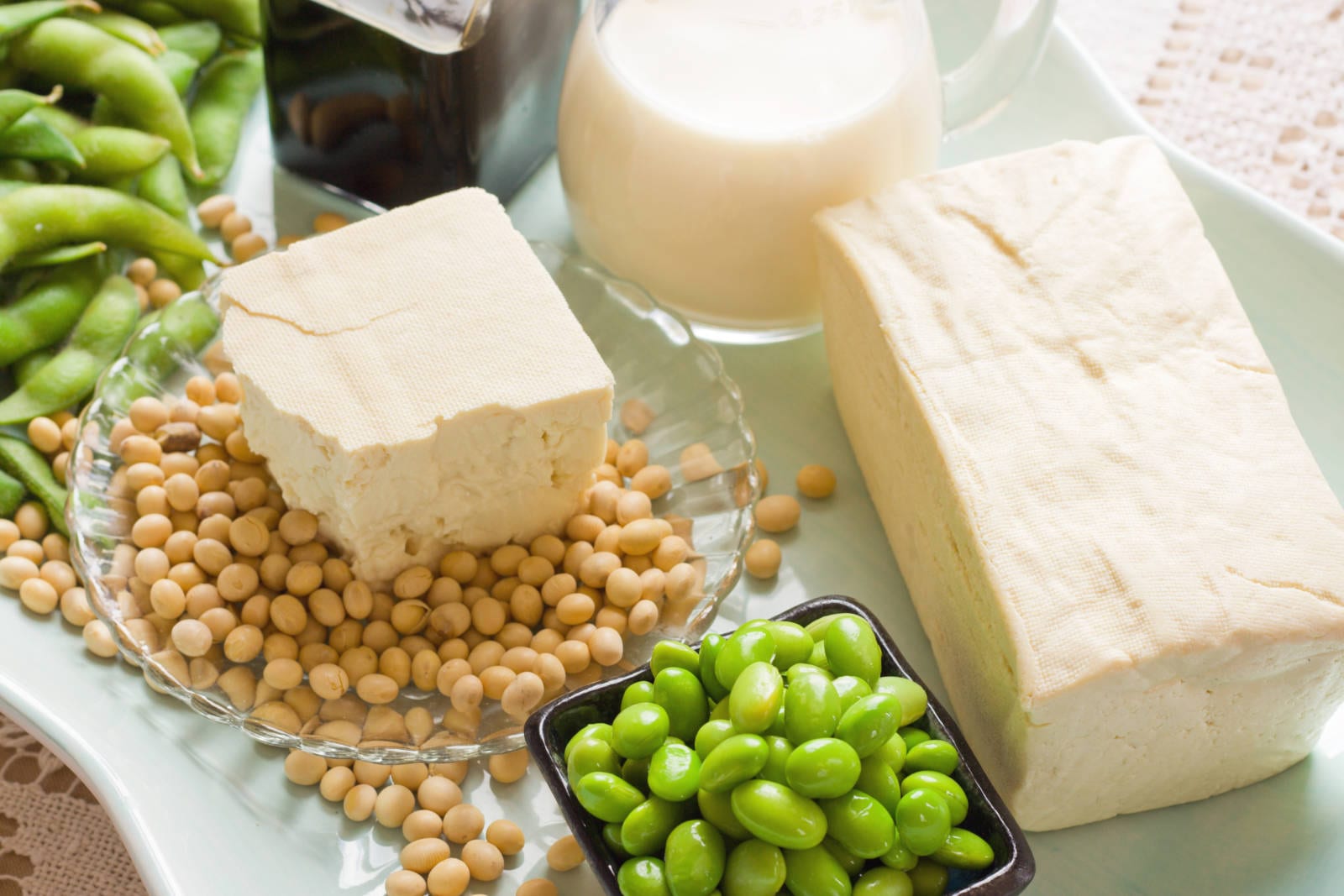The U.S. Soybean Export Council (USSEC) provides information about trends that create a demand for U.S.-grown soybeans. Soyfoods not only meet anticipated global needs for protein in a sustainable way, but several promising areas of research may point to new benefits of eating soyfoods.
Consumers of global soyfoods may be getting more good news as a stream of research indicates the possibility that soy provides health benefits beyond meeting nutrient needs. As Mark Messina, Ph.D., M.S., executive director of the Soy Nutrition Institute has noted, soyfoods have been a hot research topic for 30 years. These are three of the encouraging new areas of soyfoods research.
- Benefits of polyunsaturated fat found in soy: Cardiovascular disease is the leading cause of death worldwide.[1] Many consumers today recognize the benefit of reducing their intake of saturated fat, which increases blood cholesterol levels and the risk of heart disease. Health authorities recommend reducing saturated fat and replacing it with polyunsaturated fat.
- Polyunsaturated fat, found in vegetable oils such as soybean oil, decreases blood cholesterol levels. In fact, the U.S. Food and Drug Administration (FDA) recently approved the use of a qualified health claim for soybean oil based on its ability to lower cholesterol.[2]
- Polyunsaturated fat may protect against the accumulation of fat in the liver. Evidence from a recent study indicates that polyunsaturated fat blocks the accumulation of fat in the liver, and as a result, may reduce the risk of developing non-alcoholic fatty liver disease (NAFLD).[3]
- A diet rich in polyunsaturated fat rather than saturated fat can also enable the body to use the hormone insulin more effectively. In 2012, researchers showed that when obese diabetic individuals consumed for 10 weeks a diet rich in polyunsaturated fat, it tended to reduce their insulin resistance (inability to use insulin).[4]
- Soyfoods are good for your skin: Several clinical trials in which participants consumed soy protein containing isoflavones, or isoflavone supplements, have shown a reduction in wrinkles compared to placebo groups. For example, a European study found a 10 percent reduction in wrinkle depth among postmenopausal women who consumed an amount of isoflavones (along with other bioactives) provided by one or two servings of traditional soyfoods a day.[5] Also, in a Japanese study, participants who drank about one cup of soymilk a day saw a general improvement in the condition of their skin.[6]
- Soyfoods may improve cognitive function: Researchers in Taiwan, Australia and Japan have recently investigated the cognitive effects of eating soy. The Taiwanese study found that among both men and women aged 65 years and older, eating soyfoods daily was associated with a 55 percent lower risk of being cognitively impaired in comparison to study participants who did not eat soy.[7] In Australia, a study involving 56 participants aged 45 to 75 compared the effects of consuming whey protein with the effects of soy protein on cognitive function. There were no changes in cognition in response to whey protein, but among women, two measures of cognition—reaction time and reasoning speed—significantly improved when the participants consumed soy protein.[8] Finally, in a Japanese study, higher intake of soyfoods and soybean isoflavones was each associated with a 50 percent lower risk of cognitive impairment in women.[9]
As research continues, consumers may have more good reasons to eat soy in addition to enjoyment and its nutritional advantages. The Soyfoods Council offers globally inspired recipe suggestions featuring soy.
[1] Sacks FM, Lichtenstein AH, Wu JHY, et al. Dietary fats and cardiovascular disease: A presidential advisory from the American Heart Association. Circulation. 2017;136(3):e1-e23.
[2] Qualified Health Claim Petition – Soybean Oil and Reduced Risk of Coronary Heart Disease (Docket No. FDA-2016-Q-0995). https://www.google.com/urlsa=t&rct=j&q=&esrc=s&source=web&cd=1&ved=2ahUKEwjFsfHlsojpAhVTCs0KHU6xBxgQFjAAegQIAxAB&url=https%3A%2F%2Fwww.fda.gov%2Fmedia%2F106649%2Fdownload&usg=AOvVaw1OacdW5qPEJwAz-_0yxdGz.
[3] Rosqvist F, Kullberg J, Stahlman M, et al. Overeating saturated fat promotes fatty liver and ceramides compared to polyunsaturated fat: a randomized trial. J Clin Endocrinol Metab. 2019.
[4] Bjermo H, Iggman D, Kullberg J, et al. Effects of n-6 PUFAs compared with SFAs on liver fat, lipoproteins, and inflammation in abdominal obesity: a randomized controlled trial. Am J Clin Nutr. 2012;95(5):1003-12.
[5] Jenkins G, Wainwright LJ, Holland R, et al. Wrinkle reduction in post-menopausal women consuming a novel oral supplement: a double-blind placebo-controlled randomized study. Int J Cosmet Sci. 2014;36(1):22-31.
[6] Nagino T, Kaga C, Kano M, et al. Effects of fermented soymilk with Lactobacillus casei Shirota on skin condition and the gut microbiota: a randomized clinical pilot trial. Beneficial microbes. 20171-10.
[7] Lin HC, Peng CH, Huang CN, et al. Soy-based foods are negatively associated with cognitive decline in Taiwan’s elderly. J Nutr Sci Vitaminol (Tokyo). 2018;64(5):335-9.
[8] Zajac IT, Herreen D, Bastiaans K, et al. The effect of whey and soy protein isolates on cognitive function in older Australians with low vitamin B12: A randomised controlled crossover trial. Nutrients. 2018;11(1).
[9] Nakamoto M, Otsuka R, Nishita Y, et al. Soy food and isoflavone intake reduces the risk of cognitive impairment in elderly Japanese women. Eur J Clin Nutr. 2018;72(10):1458-62.
[10] Lin HC, Peng CH, Huang CN, et al. Soy-based foods are negatively associated with cognitive decline in Taiwan’s elderly. J Nutr Sci Vitaminol (Tokyo). 2018;64(5):335-9.
